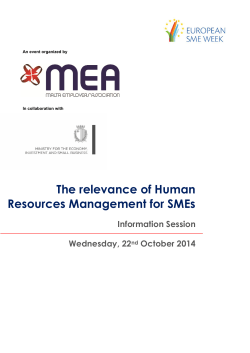
Outline of the Bill for the Act for October 2014
Provisional Translation Outline of the Bill for the Act for Demand Creation for SMEs October 2014 Small and Medium Enterprise Agency Bill for Partial Revision of the Act on Ensuring the Receipt of Orders from the Government and Other Public Agencies by Small and Medium-Sized Enterprises and Other Acts [Act for Demand Creation for SMEs (common name)] 1. Background The Bill is to revise the following three Acts with the aim of creating demand for regional entities through encouraging newly-launched SMEs to enter the tendering process for government contracts as well as developing regional-based specialties which are attractive to customers, and cultivating sales channels of such specialties, thereby expanding the virtuous economic cycle throughout the entire country 2. Outline of the Revision SME Support, JAPAN <Revision of the Act on Ensuring the Receipt of Orders from the Government and Other Public Agencies by Small and Medium-Sized Enterprises > contracts. regional-based specialties. ⇒ Support will be provided for product development and cultivation of sales channels in collaboration with retailers and internet business operators in response to consumer tastes Imabari towel Yuzu drink made in Umaji Koshu wine village Expand the Virtuous Economic Cycle throughout the Entire Country Finaicing etc. <Revision of the Act on Promotion of Business Activities by Small and Medium Sized Enterprises Utilizing Resources Derived from Local Industries> Local communities’ ● There is an abundance of unused regional resources all-out efforts to nationwide. However, full-scale, regional efforts have rarely stimulate demand been made, and current efforts have failed to connect with while leveraging customers. regional-based ⇒ In order to facilitate such regional efforts, the Act legally requires specialties proactive involvement of municipalities in making the most of Provision of information Creation of initial ● Enterprises with no track record have less chance of becoming known to the demand for newly- government and other public agencies and are not trusted sufficiently, limiting their launched SMEs that opportunities to receive orders from the public sector. ⇒ Make provisions to give special consideration to SMEs established within the last support local ten years to facilitate their participation in competition for public or government economies <Revision of the Act on the Organization for Small & Medium Enterprises and Regional Innovation, Japan> (i) Gather and provide information on orders from the public sector (ii) Provide funding for structural upgrades and information to municipalities which distribute funding to business operators which use regional resources * The revised Act is to allow METI to partially entrust the authority of on-site inspection of SME Support, Japan, to the Financial Services Agency regarding funding for structural strengthening activities. Outline of the Partial Revision of the Act on Ensuring the Receipt of Orders from the Government and Other Public Agencies by Small and Medium-sized Enterprise (Public Order Act) ○ Newly-established SMEs often lack robust track records and therefore have difficulties in expanding sales channels despite their excellent products or services. The opportunity to perform at least one public-sector contract would both provide SMEs with the ability to create the necessary track record and increase chances of securing their place in the market for the future. ○ Additionally, enterprises with no track record have less chance of becoming known to the ordering party (including the national government), and the ordering parties tend to avoid such enterprises on the grounds of lack of trust. As a result, those enterprises have only limited opportunities to receive orders from the public sector. ◆ Setting of goals ◆ Measures to increase opportunities for SMEs to receive orders including the flexible handling of eligibility for participating in bidding and utilization of discretionary contracts Incorporated Administrative Agency Z ◆ Disaster preventionrelated field ・Solid fuel for storage, etc. Provision of information SME Support, JAPAN Local governments ◆ Initiatives in line with the national government’s measures [Article 8] Publication of procurement records ◆ Green and energy conservation-related field ・High-efficiency (iii) (ii) Contracting Procurement LED lights, etc. policy ◆ Cleaning, translation, printing, etc. (v) Expansion of transactions with large enterprises, etc. Example of products or services provided by SMEs that received new orders (iii) Procurement (iv) Securing market and trust (ii) Contracting policy ・・・ * Contracting policy of the national government, (and other related entities) for FY2014, set the goals of signing 56.7% of all contracts, with a total value of 4.4 trillion yen (the highest ever) with SMEs and small-sized enterprises. Ministry A ・・・・ Outline of the Revision (Addition to the Current Act) (1) Special consideration given to newlyestablished SMEs (less than ten years after establishment) [Articles 2 and 3] (2) Formulation of a government contracting policy (basic policy) [Article 4] (3) Formulation of a contracting policy by each ministry and agency, etc. [Article 5] (4) Publication of the summary of the contracted orders [Article 6] (5) SME Support, JAPAN to provide information [Article 9] ◆ IT-related field ・Application software for business improvement, etc. Ministries and agencies (i) Government contracting policy [Cabinet decision] In order to increase the opportunity for newlyestablished SMEs to receive orders from the public sector, it is critically important to revise the Public Order Act, which aims to secure these opportunities. Outline of the Partial Revision of the Act on Promotion of Business Activities by Small and Medium Sized Enterprises Utilizing Resources Derived from Local Industries ○ The current Act (established in 2007) provides that each prefecture should designate resources derived from local industries (agriculture, forestry and fisheries products, mineral or industrial products and sightseeing resources that are recognized as local specialties; approximately 14,000 cases) and the national government should authorize and offer support to business plans of SMEs utilizing such resources (1,234 cases have been authorized). ○ Currently, each enterprise makes these efforts independently and therefore, they have made only limited contributions to local economies while generating minimal sales. Full-scale regional efforts and cultivation of sales channels are required. ○ In order to revitalize local communities by featuring regional-based specialties through the full use of resources derived from local industries, (i) municipalities should be proactively involved in and promote full-scale regional efforts by such means as declaring support for regional-based specialties, (ii) collaboration with retailers and internet business operators should be strengthened and (iii) additional assistance should be offered to experience-based tourism to further product development based on consumer tastes and cultivation of sales channels. National Government The national government authorizes business operators, and relevant ministries and agencies (METI, MIC, MAFF, MLIT, MHLW, etc.) offer support for collaboration Revision (i) Involvement of municipalities Prefectures Prefectures designate resources derived from respective local industries Regional efforts Municipalities (Declaration of support for regional-based specialties) Preferential treatment concerning loans for structural upgrades by SME Support, JAPAN Transmit Proactive involvement of municipalities is legally defined. information ・Proposals on prefectural government’s designation of regional resources ・Loans for supporting business activities utilizing regional resources ・Establishment and implementation of measures to promote business activities utilizing regional resources Consumers Preferential treatment concerning regional collective trademarks (halving of registration fees) Attract tourists Revision (iii) Experiencebased tourism * Budget request for FY2015 <Measures targeting municipalities> ○ Ministry of Internal Affairs and Communications (MIC) Plan to Vitalize Local Communities (4.7 billion yen) Creating a team to Cooperate in Vitalizing Local Communities, etc. ○ Ministry of Health, Labour and Welfare (MHLW) Plan to Create Jobs in the Region (Project to Resolve Problems concerning Employment in the Region: 3.1 billion yen) <Measures targeting business operators and consumers> Full-scale regional support SMEs and small enterprises Development of new products or services through the full use of regional resources and cultivation of sales channels, etc. Farming experience and industrial tourism, etc. are added to the businesses eligible for support measures. Revision (ii) Support Strengthening of Cooperation sales force Creation of plans supporting businesses which utilize regional resources General incorporated associations, general incorporated foundations and NPOs, etc. offer support for development of products by SMEs, Sell goods cultivation of sales channels, transmission of information, etc. Cultivation of supportive entities for every business Retailers and Internet business operators who understand consumer Linkage with related measures taken by ministries and agencies ・Preferential treatment concerning credit guarantees for SMEs ・Preferential treatment concerning debt guarantees under the Act on Promotion of Food Marketing Structure Improvement (Ministry of Agriculture, Forestry and Fisheries) ○ Ministry of Economy, Trade and Industry (METI) (9.5 billion yen) Project Supporting Regional-based Specialties: 2.3 billion yen Project Promoting Measures for Small Enterprises (Premium gift tickets, etc.): 6.8 billion yen Project Supporting Development of Hometown Producers: 0.4 billion yen ○ Ministry of Agriculture, Forestry and Fisheries (MAFF) Grants for Network Activities for establishing Agro-, Manufacturing, and Service industry integration: 3.8 billion yen ○ Ministry of Land, Infrastructure, Transport and Tourism (MLIT) Creation of Bases for Revitalization of Local Communities Centering on Roadside Stations ○ Japan Tourism Agency (1.9 billion yen) Project Promoting Wide-area Tourist Routes: 1.4 billion yen Project Creating Interest in Tourist Spots: 0.5 billion yen 機密性○ Examples of Revitalization of Local Communities by Featuring Regional-based Specialties Cases where diverse parties collaborate to develop local brands through the full use of regional resources and to revitalize local communities Annual sales of 3 billion yen from processed yuzu products Branding in collaboration with a famous designer (Umaji village, Kochi prefecture) ・A mountain village with a population of less than 1,000 ・With the decline of the forestry industry, the president of the agricultural cooperative has been taking the initiative in developing processed yuzu products. ・Thanks to TV commercials (half of the cost was borne by the Umaji municipality), the village increased visibility, created annual sales of 3 billion yen and successfully provided new employment for 100 people. (Imabari city, Ehime prefecture) ・Towel producers were worn out from severe competition with cheap foreign products. ・The industry association appointed Mr. Kashiwa Sato, a famous designer as director to carry out PR activities within and outside of Japan and succeeded in branding towels made in Imabari city. ・The city also commenced industrial tourism by constructing the Imabari Towel Craft Center. Yuzu Yuzu drink Yuzu-flavored snack The village itself became famous thanks to TV commercials * In Imabari city at present, there are approximately 120 towel manufacturers providing employment for approximately 2,500 people. Logo designed by Mr. Kashiwa Sato Local municipality supports dissemination of wine and utilizes wine for tourism (Koshu city, Yamanashi prefecture) Branding as quality chestnuts through sales to major department stores (Yamae village, Kumamoto prefecture) ・With support from the national government, Yamanashi prefecture and Koshu city, the business cooperative union and business operators made efforts to disseminate the Koshu wine brand and expanded sales overseas. ・The city has supported the industry by establishing the origin certification system and granting subsidies for planting Koshu grapes for making wine. ・New tourism products featuring Koshu wine are also being developed. ・A young business manager, who closed his former business due to the Lehman Shock, started a new business to reestablish the Yamae Riheiguri brand (chestnuts). ・With high-quality marketing tactics, efforts have been made to sell products to department stores and famous restaurants in Tokyo. Yamae Riheiguri was also adopted in the restaurant on the JR Kyushu Cruise Train Nanatsuboshi. ・The price of Yamae Riheiguri increased from 250yen/kg to 620 yen/kg. ← Five pieces of chestnut compote are sold at 10,000 yen. Koshu wine Grape-stomping experience Koshu Fruits Marathon Race; Wine is provided to participants after finishing the marathon Adopted as sweets served on the Cruise Train Nanatsuboshi →
© Copyright 2025

















